AVIVA-Berlin >
Jüdisches Leben
AVIVA-BERLIN.de 7/25/5786 -
Beitrag vom 16.07.2012
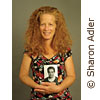
Memories Lost and Found. Meta Adler
Donna Swarthout
Donna Swarthout, Jewish-American writer, moves to Berlin and unexpectedly discovers a lost and forgotten relative. She embarks on a journey to ensure that her great aunt Meta will be remembered.
The stamp of German Jewish culture left its imprint on me as a child growing up in New Jersey in the 1960s. My nanas, papas, and tantes spoke German and Yiddish and served kuchen instead of cookies. They dressed up a lot more than ordinary Americans and seemed very refined. They were still immigrants in a new country whose dependence on each other deepened the bonds within our extended family.
Decades later as an adult living in California and Montana, there were only rare moments to connect with my cultural heritage. I often tried to reach back and touch the memories from my childhood, to bring them closer and feel their presence in my daily life. But how could I grasp these vague shapes from the past as they receded further into the distance? My memories were no longer solid or extensive enough to offer more than a footnote to my identity. I was floating through life in the vast ocean that is America without an anchor, without a strong enough sense of home.
Most of my relatives who were born in Germany are gone now so the only way to reclaim my past was to come back to the land from which they fled. I took this step two years ago and have wandered since then without a map or plan into the rooms of a place that is both new and familiar. The events that my parents closed the door on are here for me to discover and the memories from my childhood seem closer at hand. I´ve picked up the thread of family history that was broken in 1938 and am stitching it back into the fabric of a changed Germany.
Like a time traveler, I have journeyed through the past and present, trying to understand the extent to which Germany lays a claim on me. I´ve opened myself to the pain of a genocide that cannot be understood and the joys of finding my place in the vibrant landscape of Jewish life in Berlin. I came here to experience the culture that captivated my senses as a child, but I never expected to find anything that would shed light on my own family history. I never suspected that my family kept secrets.
Last year I reached into the past and discovered my great aunt Meta. Meta lived with my father´s family, first in Altwiedermus and later Frankfurt, until they left for America in 1938. Meta was a simple country woman who never married and worked as a maid. When everyone in the family except Meta passed the U.S. immigration exam, a decision was made. My grandfather, Meta´s brother, arranged for his wife, children, and mother-in-law to flee. Meta was left behind.
Confirmation of Meta´s fate came from the Yad Vashem database in Jerusalem. Her death refuted the version of family history told by my parents, the version where everyone escaped to safety. Meta was a member of my father´s household so I should have been told about her. The discovery that our family did not keep her memory alive hit harder than the hollow pain upon learning her fate. When my father´s family closed the door on their homeland, they locked Meta into a past that would remain hidden from the next generation.
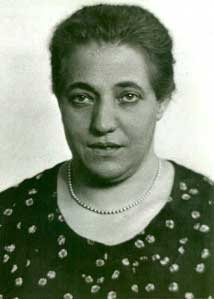
Meta Adler. © Adler family
My father was eight when he left Germany so he would have remembered Meta. But he passed away nine years ago so there was no chance for me to delve into his memory or feelings about the aunt who suddenly disappeared from his life. Instead, I learned the bare outlines of Meta´s story from the village historian in Altwiedermus, gratefully accepted the one photo she gave me, and gathered the sparse records that were still available.
It would have been easier not to dig up the past, to put aside my determination to fill in the gap in my family history. I could have avoided the awkward discussions with my aunt, the charges of tainted motives from one of my cousins, and the countless hours spent searching for records that had been destroyed. But the injustice of a lost memory loomed so much larger than the tensions caused by confronting my family´s silence.
My father´s silence was the most profound. He only wanted his two daughters to hear about how the family escaped to America, struggled as poor immigrants, and successfully pursued the American dream. He protected us from having to grieve over a loss that he had no control over. But the descendants of those who escaped and survived should not be spared from knowledge or grief, we have a collective responsibility to learn our stories and remember them.
More than seven decades of silence about a forgotten Holocaust victim have now ended. On July 2, 2012 we placed a stolperstein for Meta in front of the former Adler residence in Altwiedermus. We restored Meta to her place in our family and her village. This small stone is tangible evidence of a lost life, like a gravestone it marks a place to honor the dead. Meta´s stone is a permanent link to the past for our family and a town that has had no Jewish population since 1938.
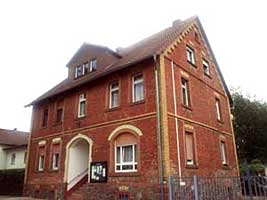
© Donna Swarthout. Former Adler house in Altwiedermus
Meta´s memorial ceremony was the culmination of more than a year of effort to reconcile an omission in my family history. I did not come to Germany to be a family researcher or Holocaust historian. I never expected to experience the kind of pain and grief that I felt about Meta. But my need to account for the past placed me on the path of a single victim, and brought a depth of sorrow that I had been shielded from as the daughter of German Jewish parents.
As I stood on the steps of my father´s childhood home before the small crowd gathered on a rainy Monday morning for Meta´s memorial ceremony, I could barely retain the composure necessary to speak for Meta. But with the support of my sister and my son, who raised the money for Meta´s stolperstein as part of his bar mitzvah in Berlin, I gave voice to the life of a woman who was forgotten. This is one of the most powerful things I have ever done in my life.
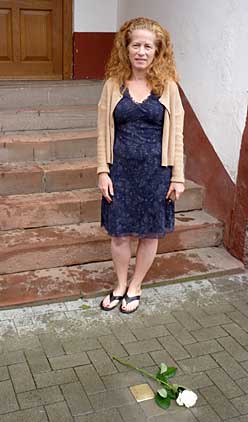
© Donna Swarthout. Donna Swarthout in front of the former Adler house in Altwiedermus after the Stolperstein-ceremony
I´ve made other discoveries about my family since coming to Germany, discoveries from the lost and found of a land that holds many fragments of a dark past. Each discovery strengthens my sense of self and helps me to find my footing as a Jewish woman in Germany today. I don´t want to lose myself in the past, but to touch and preserve a part of what was left behind, to carry the reclaimed memories with me into the future. I feel more free to live in the present now and ready to fill the pages of a new chapter in my family´s German Jewish history.
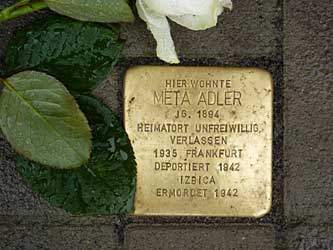
© Donna Swarthout
Donna Swarthout moved to Berlin from Bozeman, Montana with her husband and three children in July 2010. She is the daughter of German Jewish parents who fled Germany in 1938. She holds a Master´s degree in political science from the University of California Berkeley and has close to fifteen years of experience as a college instructor. Swarthout had her German citizenship restored last fall around the same time that her oldest son became a bar mitzvah in Berlin´s former Jewish orphanage. Last year she also discovered her great Aunt Meta who was a Holocaust victim. Swarthout wrote an earlier story about Meta for The Jewish Writing Project which you can access at jewishwritingproject.wordpress.com. You can read more about her experiences on her blog Full Circle www.dswartho.wordpress.
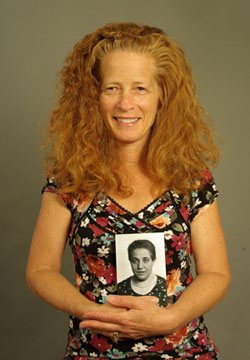
You can now also read the german version of this article at AVIVA-Berlin
Das Projekt "Jüdische Frauengeschichte(n) in Berlin - Writing Girls - Journalismus in den Neuen Medien" wurde ermöglich durch eine Kooperation der Stiftung ZURÜCKGEBEN, Stiftung zur Förderung jüdischer Frauen in Kunst und Wissenschaft
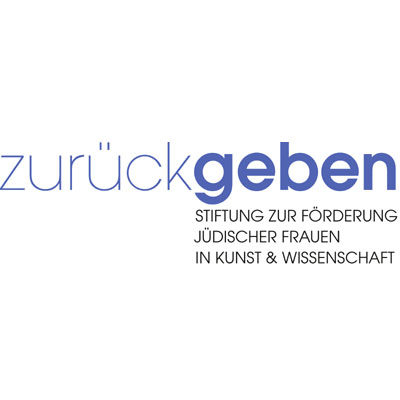
und der Stiftung Erinnerung, Verantwortung und Zukunft (EVZ)

Weitere Informationen finden Sie unter:
www.stiftung-zurueckgeben.de
www.stiftung-evz.de
